Vietnam's thriving property market
Wealthy international investors are flocking in. Vietnam is now widely seen as the next luxury property market hotspot, with a booming economy, coupled with laws that recently have made it easier for foreigners to purchase property.
As a result, there´s been a surge of high-end real estate developments in recent years.
Local demand is also continuously rising. “We have more and more very rich Vietnamese, particularly entrepreneurs looking for places to put their money,” said Neil MacGregor of Savills Vietnam. The number of Vietnamese with net assets of US$30 million or more surged by 320% in the past decade, the fastest pace globally ahead of China and India.
“Most Asian businesses turn to real estate when they become successful in whatever core business they have,” said Andy Ho of VinaCapital Group Ltd. “When their country’s wealth grows up, people buy real estate.”
Because of strong demand, residential property prices are rising strongly.
In Ho Chi Minh City, apartment prices surged 22.7% in Q1 2019 from a year earlier, to an average of US$2,028 per square metre (sq. m.), according to Jones Lang La Salle Vietnam. Likewise in Hanoi, the average price of apartments rose by 6.8% y-o-y to US$1,407 per sq. m. in Q1 2019.
Sales have been greatly assisted by the Housing Law and Law on Real Estate Business (effective July 1, 2015), by the law on Sell and Transfer of Real Properties (subsequently fleshed out by Decree No 99 (effective December 10, 2015) and by Circular 19 (effective August 2016). Moreover, the Comprehensive and Progressive Agreement for Trans-Pacific Partnership (CPTPP), officially came into force in January 14, 2019, is also expected to attract more foreign investors.
Vietnam´s improving infrastructure is also a plus factor. “Vietnam focuses on investment in infrastructure including 2,000 km of new highways, subway systems in Hanoi and Ho Chi Minh City, and many airport expansion and construction projects,” said JLL.
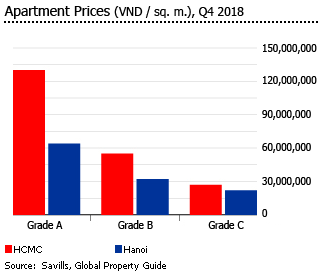
In 2018, the Vietnamese economy grew by a robust 7.1%, after expansions of 6.8% in 2017 and 6.2% in 2016. Vietnam is expected to continue its stellar growth in the coming years, with projected annual GDP growth rate of 6.5% both this year and in 2020, according to the International Monetary Fund (IMF).
Foreigners are not allowed to own land. In fact, even citizens are not allowed to own land. In Vietnam, land is theoretically collectively owned by the people, but regulated by the State.
Foreign residents in Vietnam are permitted to purchase dwelling houses and can own the house but not the land on which it is built.
Outlook remains bullish
The outlook for the Vietnamese housing market remains bullish due to continued strong economic growth, rapid urbanization growth, and the construction of several mega projects in major cities.
“Overall, 2018 was a positive year for the real estate market, and we expect this performance to continue in 2019 in all segments,” said JLL.
“Vietnam´s real estate race is becoming hotter than ever with the growing attention of many domestic and foreign investors, recording a record amount of investment in recent years,” JLL added.
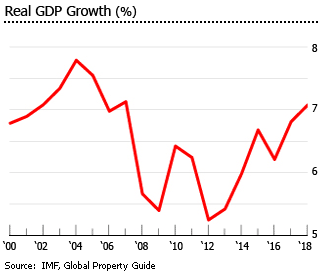
The positive outlook is supported by Savills Vietnam. “There was increased interest from foreign purchasers in high-end projects, with the 30% foreign quota quickly filling up. This trend is expected to continue, with higher price points expected across all grades.”
Luxury condo prices are expected to rise to about 10% by early 2020 to US$6,000 per sq. m., based on CBRE forecasts.
The high-end condo market is booming
In Ho Chi Minh City, prices of luxury condominium units soared by 17% to an average of US$5,518 per sq. m. in 2018 from a year earlier, according to CBRE. In HCMC’s city center, the price of a luxury apartment starts at US$5,000 per sq. m., according to Sunny Hoang of Savills.
At Feliz en Vista, a four-tower luxury condominium development in HCMC’s District 2, condos are currently priced between US$232 and US$290 per square foot (sq. ft.), according to Bloomberg. This means that a 1,722 sq. ft. four-bedroom condo unit is offered from US$400,000 to US$500,000. Almost all of the units at Feliz en Vista were already sold by end-2018.
At The Grand Manhattan, a 39-storey development located in HCMC’s District 1, known as “Saigon’s Wall Street,” selling prices for New York City-inspired condominium units start at about US$557 per sq. ft.
Vietnam opens up to foreigners
On July 1, 2015, the Housing Law (Law on Housing No. 65/2014/QH13) became effective. It has had enormous significance.
First, foreigners who have been granted a Vietnamese visa, plus foreign investment funds, banks, Vietnamese branches and representative offices of overseas companies can now purchase residential property. Foreigners can now own all types of properties, including condominiums and landed property such as villas and townhouses. Properties owned by foreigners can be sub-leased, inherited and collateralized.
Second, overseas Vietnamese who have maintained their Vietnamese citizenship will be treated like locals and are permitted to own unlimited property in their own names. It is estimated that about 70% of the 4 million overseas Vietnamese around the world still maintain their original citizenship.
For foreign individuals the house ownership period is 30 years, but it can be extended. The new law also limits foreigners from owning more than 30% of a single apartment building, or more than 350 houses and apartments in a ward, a subdistrict-level administrative area. The Ho Chi Minh City Real Estate Association has objected to this, because of the concentration of foreigners in key districts.
The revised housing law has revitalized the property market and sent a broader message that Vietnam is open for business. "The government is looking at ensuring that Vietnam continues to be competitive, continues to be attractive to foreign investors, and to create an environment where business can thrive," said David Lim of ZICOLaw Vietnam.
Detailed guidelines on implementing the Housing Law (Decree 99) became effective on December 10, 2015. According to Decree 99, foreigners are allowed to own houses in Vietnam as long as they were able to meet these conditions:
- The foreigner’s valid passport should have an entry stamp affixed to it from Vietnam’s immigration authority.
- They should not be in the category of people entitled to preferential treatment or diplomatic immunity in accordance with the Ordinance on Preferential Treatment Rights and Immunities Applicable to Representative Diplomatic Offices, Foreign Consulates and Representative Offices of International Organisations in Vietnam.
On August 15, 2016 the Ministry of Construction Circular 19/2016/TT-BXD (Circular 19) which contains guidelines on the Law on Housing, and on Decree No. 99/2015/ND-CP, became effective.
- Foreigners can only own up to 30% of the total residential apartments of a particular condominium.
- As for individual houses under commercial housing projects (including villas and semi-detached housings), foreigners are allowed to own 10% of the total individual houses of a particular project.
Perpetual Lease
In theory, freehold land does not exist in Vietnam. Land can only be leased, even by Vietnamese; though in reality many leases seem to be for indefinite terms. "Buying" land is technically a transfer of leasing rights. The creation of a perpetually renewable lease means that Vietnam now has one of the most open property markets in Asia.
New free trade agreement expected to attract more foreign investors
The Comprehensive and Progressive Agreement for Trans-Pacific Partnership (CPTPP), which came into force in January 2019, is a free trade agreement between Australia, Brunei Darussalam, Canada, Chile, Japan, Malaysia, Mexico, Peru, New Zealand, Singapore and Vietnam, based on an article from multinational law firm Baker McKenzie. The agreement is expected to benefit the real estate market in the country.
- Foreign investors are protected through the Investor State Dispute Settlement (ISDS) mechanism, which applies to cross border investments in property development.
- The CPTPP also enlarges the real estate services in which foreign investors can participate in, including real estate brokerage services, real estate exchange floors, real estate consulting services and real estate management services, with respect to both residential and commercial properties.
“CPTPP & EU Trade Agreements together with other FTAs will help balance the negative effects that may arise from the US-China trade war,” said JLL.
Rising demand from wealthy locals
A growing number of rich and middle-class Vietnamese are buying real estate. In fact, homeownership rate in Vietnam exceeds 90% - one of the highest in the world.
“We have more and more very rich Vietnamese, particularly entrepreneurs looking for places to put their money,” said Niel MacGregor of Savills Vietnam.
One of the main factors driving demand is the shift away from the Asian tradition of several generations living under one roof.
“We’re seeing a significant change, where young couples prefer to escape from their parents after marriage,” said Duong Thuy Dung of CBRE. “They like to buy condos in gated communities.”
Sales transactions up in Hanoi, down in HCMC
In Hanoi, apartment transactions surged 69% in Q4 2018 from a year earlier, according to Savills. Over the same period, villa and townhouse transactions in the capital city rose by 21%. Gia Lam accounted for the biggest share, with 52% of sales, followed by Dong Anh and Long Bien with 9% each.
In contrast, apartment sales in HCMC fell by 27% y-o-y to just over 11,000 units in Q4 2018. Likewise, sales for villas and townhouses were down 57% from a year ago, mainly due to limited supply, according to Savills. Go Vap led the market, registering 33% of the total sales.
Supply continues to rise
In Hanoi, the completion of 8 new apartment projects and the next phases of 28 projects provided about 15,100 units in Q4 2018, up by a staggering 120% from a year earlier, according to Savills. Most of the increase was in the affordable and mid-end segments. Grade B apartments (those with an average price of VND32 million or US$1,374 per sq. m.) accounted for 61% of stock, followed by Grade C with 31% and Grade A with 8% share.
In HCMC, 23 new projects and 13 next phases of existing projects supplied over 9,500 apartment units in Q4 2018. Currently, there are more than 18,300 new apartment units in HCMC.
In 2019, more than 66,000 apartment units in HCMC are expected to enter the market, in addition to about 41,300 units in Hanoi. In fact, over 154,000 new apartment units will be launched from 100 projects in HCMC in the next three years.
Supply of villas and townhouses is also rising.
In Hanoi, four new projects and 9 new phases supplied almost 2,350 new dwellings in Q4 2018. In 2019, new villa developments including Athena Fulland by Vimedimex, Sunshine Wonderland by Sunshine Group and Vincity Sportia by Vingroup are expected to enter the market.
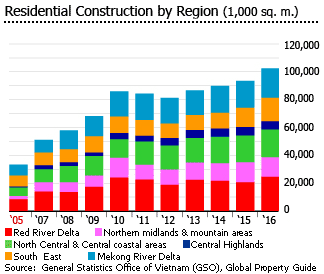
In HCMC, five new small-scale projects and one new phase of an existing development added about 390 new dwellings in Q4 2018. Primary stock reached over 1,280 dwellings in Q4 2018. From 2019 to 2021, about 22,65o dwellings are expected to enter the HCMC market. Suburban districts, such as District 9, Binh Tan, and Binh Chanh will contribute around 56% of future dwelling supply.
Apartment rents rising, despite increasing supply
In Hanoi, monthly apartment rents ranged from VND 300,000 (US$13) to VND 750,000 (US$32) per sq. m. in Q4 2018, up 5% from a year earlier, according to Savills. The average occupancy rate in the capital city remained unchanged at 86% in Q4 2018.
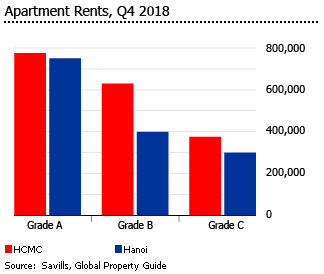
In HCMC, serviced apartment rents ranged from VND375,000 (US$16) to VND775,000 (US$34) per sq. m. per month in Q4 2018, up 4% from the previous year. The total stock of rental apartments in HCMC was over 5,700 units in 2018, up 20% from a year earlier – the highest growth in five years.
From 2019 to 2020, a total of 1,100 rental apartment units from nine projects in Hanoi are expected to enter the market. On the other hand, in HCMC, an additional 1,700 units from 12 projects are expected to be completed in the next three years.
Rental yields remain high in HCMC
Apartment rental yields in HCMC remain high at around 5.8%, according to Savills World Research.
Overall, round trip transaction costs are low in Vietnam. See our Property transaction costs analysis for Vietnam and Property transaction costs in Vietnam, compared to the rest of Asia.
Underdeveloped mortgage market
The Vietnamese mortgage market is still underdeveloped; most homebuyers pay cash. Developers are now starting to work with banks to offer mortgages to buyers, but high interest rates and strict loan procedures still hinder the local mortgage market. The loan-to-value (LTV) ratio rarely exceeds 50% of the appraised value of the property. The term period is usually 15 years.
In April 2019:
- VND-denominated loans: the average lending rate for short-term loans ranged from 6% to 9% while medium and long-term loan rates ranged from 9% to 11%, according to the State Bank of Vietnam (SBV).
- USD-denominated loans: the average lending rate for short term loans ranged from 2.8% to 4.7% in April 2019 and 4.5% to 6% for medium and long-term loans.
In April 1, 2019, PM Nguyễn Xuân Phúc issued Decision No. 355/QD-TTg, lowering the preferential interest rates for social housing or construction, renovation and repair of housing to 4.8% this year. In addition, the total allocation for social housing program this year is over VND 1.32 trillion (US$ 56.36 million), from which VND 663 billion (US$28.31 million) will come room the State budget and the remaining half will come from the Vietnam Bank for Social Policies (VBSP).
The memory of a housing bust (2009-2013)
Vietnam witnessed a prolonged housing crisis after the global crisis. Property prices plunged by double-digit figures. The government was embarrassed, banks were bankrupted, and the economy slowed sharply.
Residential projects stalled in mid-construction (an example being the Saigon Residence, a high-end residential building in Ho Chi Minh’s centre). Many property developers delayed launching projects.
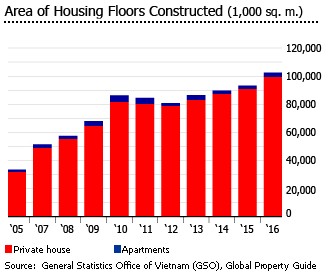
The banking system effectively collapsed. One out of every ten loans in the banking system stopped paying, according to the central bank, but Fitch Ratings believes the percentage of bad loans was higher.
To bolster demand, the government provided the real estate market with a US$1.4 billion stimulus package in 2013, subjected developers to stricter financial requirements, and bought US$8 billion of non-performing loans especially from the real estate sector. The State Bank of Vietnam (SBV), the country’s central bank, slashed the refinance rate and discount rate several times, and a VND5 trillion (US$215 million) credit package was given to homebuyers by the Vietnam Bank for Industry and Trade (Vietinbank). These measures were, over time, successful.
Stellar economic growth
In 2018, the Vietnamese economy expanded by 7.1% from a year earlier – its fastest growth in 11 years. Then in Q1 2019, GDP grew by 6.79% y-o-y, slightly down from annual expansions of 7.31% in the previous quarter and 7.45% a year earlier, according to the country’s General Statistics Office (GSO).
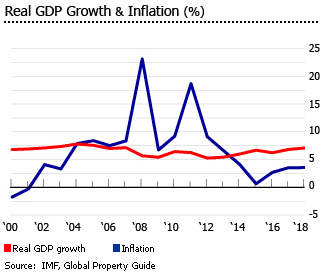
Vietnam is expected to continue its stellar growth in the coming years, with projected annual GDP growth rate of 6.5% both this year and in 2020, according to the International Monetary Fund (IMF).
Vietnam has experienced almost four decades of uninterrupted growth.
- 1981-1990 - average real GDP growth of 5.9% per year
- 1991-2000 - average real GDP growth rate of 7.6% annually
- 2001-2010 - average real GDP growth rate of 6.8% annually
- 2011-2018 – average real GDP growth rate of 6.2% annually
The Vietnamese government continues to ease business regulations and is pursuing a long-running privatization drive, to boost growth further.
The tourism industry registered a record of 15.5 million international visitors and 80 million domestic tourists in 2018, according to JLL. The country aims to receive 20 million international visitors by 2020.
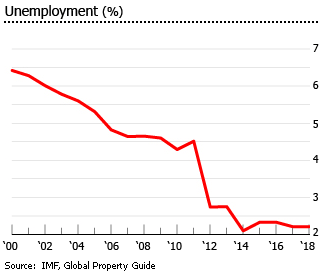
The country’s unemployment stood at 2.17% in Q1 2019, almost unchanged from the prior year’s 2.19%, based on figures from the GSO. From 6.42% in 2000, Vietnam’s unemployment rate has continuously declined to reach 2.21% in 2018, according to the IMF.
In May 2019, Vietnam’s annual inflation stood at 2.88%, far below the 3.9% inflation recorded during the same period last year, according to the GSO. Inflation is expected to average 3.5% this year, below the central bank’s target of 4%, according to the Asian Development Bank (ADB).
Vietnamese dong moves to a market-based mechanism
In January 2016, the central bank announced a move to a market-based exchange rate mechanism, setting daily reference exchange rates, to discourage hoarding of US dollars. The dong has been pegged to the US dollar for several decades, within a limited band of 1% to 2%. But because of sudden devaluations, many prefer to hold dollars.
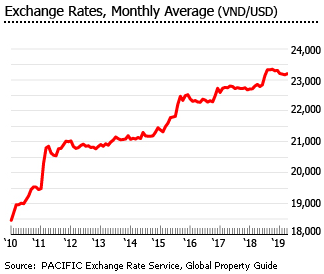
However the new rate is not really "free". The central bank sets a reference rate daily, and local and foreign banks in Vietnam can trade within a band of plus or minus 3%. The rate depends on three factors: (i) the inter-bank rate, (ii) macroeconomic balances, (iii) currency movements in the country’s key trade and investment partner countries.
Over the past year, the dong lost about 1.5% of its value against the US dollar, reaching an average monthly exchange rate of VND 23,199 = USD 1 in April 2019.
In May 2019, the US indicated that Vietnam is under scrutiny for possibly manipulating its currency – artificially holding down the value of the dong.
property developers in uae, buying property in vietnam, real estate agents hong kong, real estate in cambodia, real estate developers in dubai, indian real estate market forecast 2018, real estate companies in india, hong kong real estate agent, jeju island real estate, vietnam real estate agents, buying properties in vietnam, buy property in vietnam, property developers in dubai, vietnam real estate, property management companies in dubai, top real estate developers in dubai, real estate agents bangkok, property developers melbourne, vietnam real estates, can foreigners buy property in vietnam, real estate companies in dubai, buying properties in hong kong, real estate agency bangkok, real estate agents in dubai, hong kong real estate companies, china real estate company, real estate agent in bangkok, property developers in malaysia, vietnam realestate, buy property in cambodia, real estate developers in india, real estate agents in bangkok, property indonesia, real estate companies in singapore, property agent hong kong, countries with no property tax, buy house in vietnam, developers in the philippines, property agents bangkok, vietnamese real estate agent, china real estate companies, hong kong property agent, buy land in china, osaka real estate, buy property in hong kong, chinese real estate company, laos real estate, cambodia real estate, buying a house in south korea, philippine real estate bubble, property agents hong kong, buying property in philippines, country with no property tax, buy property in china, china developer, real estate agency in dubai, property agency hong kong, buying land in vietnam, guangzhou real estate, buy house in korea, can foreigners buy property in usa, buy land in vietnam, realtors in dubai, real estate ho chi minh city, buying land in the philippines, buy a house in south korea, buying a house in korea, nha trang real estate, buying land in china, saigon real estate, real estate companies in japan, buying properties in the philippines, buying property in thailand, real estate agency dubai, buy condo philippines, buying property in bali, indian real estate market forecast 2017, buying property in china, manilla condominiums, real estate agent in dubai, real estate agency hong kong, property agent bangkok, real estate agent philippines, buying property in hong kong, commercial property hong kong, can a foreigner buy a house in usa, commercial real estate hong kong, buying properties in singapore, hokkaido real estate, developer in malaysia, buying property in singapore, property developer in malaysia, vietnam real estate foreign ownership, buying property in cambodia, malaysia real estate, philippine real estate market, danang real estate, dubai real estate companies, condo in manila, vietnam real estate market, can foreigners buy property in china, shanghai apartments for sale, chinese real estate developers, countries without property tax, countries with no property taxes, seoul real estate, real estate agent bangkok, developers in dubai, real estate in vietnam, buy condo hua hin, buy land in philippines, china real estate price, philippines real estate bubble, shanghai real estate, buy land in cambodia, can you own land in china, buying house in vietnam, buy house in singapore, japanese real estate agent, real estate agent dubai, buying land in cambodia, bangladesh real estate, buy property in singapore, buying a house in the philippines, bali real estate agent, macau real estate, condominiums in manila, buy apartment in seoul, philippine.real estate bubble, buy property in the philippines, buying properties in china, buying property in the philippines, buying land in philippines, shanghai property, property agent in bangkok, buy land in the philippines, buying properties in philippines, buying land in japan, property in vietnam, phuket real estate agent, condominiums manila, chinese real estate agency, buying japanese property, best place to live in malaysia, buying a house in usa for foreigners, philippines real estate market, vietnam property for sale, buy land in japan, buying property in japan, buy house in bali, chinese real estate companies, can americans buy property in canada, buy house in philippines, buying house in singapore, buying a condo in the philippines, vietnamese real estate market, buying a house in japan, property investment in vietnam, real estate agents philippines, countries where foreigners can buy land, buying in korea, penang real estate, buying house in philippines, realtor vietnam, malaysia real estate market, condos in manila, buying property in indonesia, buy house in china, buying a house in china, buying properties in canada, real estate vietnam, real estate agents in thailand, phuket real estates, vietnam property, buy apartment shanghai, can foreigners buy property in japan, real estate agent manila, foreigner buying property in usa, buying house in china, retirement in penang malaysia, property agents in hong kong, philippines realtors, can you own property in china, buying a home in the philippines, foreigner buy property in usa, can foreigners buy property in philippines, buy property in japan, property developer melbourne, malaysia properties market, phuket real estate agents, rules for foreigners buying property in usa, vietnam properties, land for sale in vietnam, korean real estate agent, property for sale in ho chi minh city vietnam, vietnam property for sale, warehouse rental, real estate in vietnam for sale, house in vietnam, house prices in vietnam, vietnam house for sale, vietnam homes, vietnam houses, property for sale in vietnam, phu my hung house for sale, buy house in vietnam, warehouses for rent, saigon villa, apartment for rent in ho chi minh city, house for rent in vietnam, how much is a house in vietnam, vietnam house, vietnam home, houses in vietnam for sale, vietnam real estate agents, vietnamese house for rent, vietnam condo for sale, apartments in ho chi minh city, ho chi minh city real estate, house in vietnamese, vietnam apartments, vietnam property, warehouse for rent near me, vietnam properties for sale, vietnam house for rent, vietnam houses for rent, apartment for rent in saigon, realtor vietnam, sky garden vietnam, vietnam condominiums for sale, vietnam condos for sale, phu my hung villa, phu my hung house, vietnamese homes, buildings to rent, vietnam house price, saigon apartments for rent, vietnamese house prices, hcm real estate, property for sale in ho chi minh city vietnam, shophouse rent, ho chi minh city apartments, vietnam properties, vietnam condo, ho chi minh apartments, apartment ho chi minh, vietnam house prices, factories for sale, restaurants for sale, vietnam apartment, bakery for rent, the estella apartment, buying house in vietnam, apartment for rent saigon, house for rent in saigon, appartment for sale, ho chi minh house, rent district 9, property in vietnam for sale, vietnamese houses, vietnam housing prices, factory for rent, property in vietnam, buy land in vietnam, rent shophouse, rental shops, wharehouse for rent, rent a factory, vietnamese real estate agent, apartments for rent in saigon vietnam, apartment for rent ho chi minh city vietnam, buying properties in vietnam, vietnam apartments for rent, buying land in vietnam, apartments in vietnam, empty warehouse for rent, hoc mon vietnam, land ho land for sale, vietnamese restaurant for sale, saigon realty, estella apartment, buying property in vietnam, binh than, apartments in ho chi minh city district 1, apartement for sale, rent a shop, houses of vietnam, warehouse for rent by owner, housing in vietnam, vietnam rentals, rentwarehouse, cafes for rent, building for rent, small shops for sale, hoc mon, ware house rental, ware house for rent, pizzeria for rent, coffee shop for rent, saigon apartments, showroom for rent, bar for rent, apartment for sale, factory rental prices, tan binh district, buying property in philippines for foreigners, how much is a house in vietnam, buy condo bangkok, builders in bangladesh, palawan real estate
Sources:
- Property Market Brief 1Q19 (Jones Lang La Salle): http://www.joneslanglasalle.com.vn/vietnam/en-gb/research/368/property-market-brief-1q19
- Quarterly Market Briefing Q4/2018 (Savills): http://pdf.savills.asia/asia-pacific-research/vietnam-research/quarterly-market-reports---english/vietnam-qmr-brief-q42018-en.pdf
- World Economic Outlook Database (International Monetary Fund): https://www.imf.org/external/pubs/ft/weo/2019/01/weodata/index.aspx
- Investment (General Statistics Office): https://www.gso.gov.vn/default_en.aspx?tabid=776
- Vietnam Real Estate Newsletter (February 2019) (Baker McKenzie): https://www.bakermckenzie.com/en/insight/publications/2019/02/vietnam-real-estate
- The luxury real-estate market in Vietnam is heating up — and it´s luring foreign buyers in with ´sky mansions´ at a fraction of what their cost would be in NYC or Hong Kong (Business Insider): https://www.businessinsider.com/vietnam-luxury-real-estate-market-sky-mansion-prices-photos-2019-3
- The 5 trends that will shape Vietnam real estate in 2019 (Jones Lang La Salle): http://www.joneslanglasalle.com.vn/vietnam/en-gb/news/483/the-5-trends-that-will-shape-vietnam-real-estate-in-2019
- The Hot New Market for Luxury Property Is Vietnam (Bloomberg): https://www.bloomberg.com/news/articles/2019-02-18/manhattan-luxury-comes-to-one-of-asia-s-hottest-property-markets
- Buying costs are low in Vietnam (Global Property Guide): https://www.globalpropertyguide.com/Asia/Vietnam/Buying-Guide
- Vietnam’s 2019 inflation forecast at 3.5 per cent (Vinachem): http://www.vinachem.com.vn/news/news-vnc/vietnams-2019-inflation-forecast-at-3-5-per-cent.html
- Mnuchin Meets With Vietnamese After U.S. Warning on Currency (Bloomberg): https://www.bloomberg.com/news/articles/2019-05-23/mnuchin-meets-with-vietnamese-after-u-s-warning-on-currency
- U.S. Treasury to Name-Shame Vietnam for Manipulating Its Dong (CNN): https://www.ccn.com/u-s-treasury-to-name-shame-vietnam-for-manipulating-its-dong